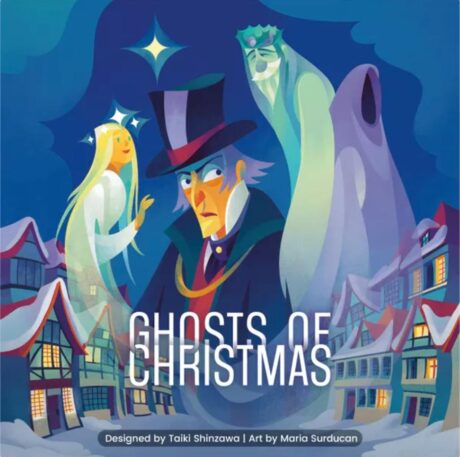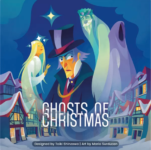- Learning time
- 20 minutes
- First play time
- 60 minutes
Ghosts of Christmas
Designed by: Taiki Shinzawa
Previously published as Time Palatrix, the card game Ghosts of Christmas takes the classic genre of trick-taking and attaches it to a weird, head-bending theme of time. It’s a cross between Dickens’ A Christmas Carol and… something stranger.
In front of all players are their own miniature timeline, broken into past, present and future-tense. In each round, tricks will be played to each ‘tense’ and then resolved, with the highest card in each suit winning, unless a trump card has been played. It sounds simple, but around the simple three-tricks premise, Ghosts of Christmas has built a confection of catches and caveats. Firstly, although standard trick-taking rules apply to each of the tricks – you must follow suit if you can – there’s nothing stopping you focusing on the three tenses in the same order anyone else is. Thus, if someone plays a yellow suited card into the past, for instance, you might play your only yellow-suited card into the present or future trick (as long as you’re following – or establishing, if your card is first to arrive – the suit there). Once everyone has played a card to every trick, the tricks are resolved, with the most powerful card winning the trick. Catch number two is that these tenses are resolved in more traditional order: past, present, and future. That means that whoever wins the past trick will effectively lead the present trick, and whoever wins the present trick will lead the future. This can cause weird reversals of fortune where a card someone ‘threw away’ in a trick suddenly wins it for them!
Finally as if that wasn’t all bonkers enough for you, Ghosts of Christmas asks you to predict how many tricks you’ll win! A correct prediction is worth 2points per trick. An incorrect one is worth… nothing! You can however give yourself the safety net of optional tricks that you can win or lose. The mini-catch there is that all your won tricks are only worth a single point instead of two – and you’ll still score zero if you win too many tricks, or not enough.
After you’ve played as many rounds as there are players, the player with most points wins, and is anointed best 19th-century-novella-inspired time-traveling trick-taker. Or something.
The guru's verdict
-
Take That!
Take That!
There's nothing in the way of direct targeting, but the game is replete with moments where the rug may be pulled from under you.
-
Fidget Factor!
Fidget Factor!
Low to moderate, depending on who's playing. Each trick is simply the choosing of a card, and sometimes circumstance dictates your choice anyway...
-
Brain Burn!
Brain Burn!
...but the key to Ghosts of Christmas is navigating the weird twist between the three tricks, played simultaneously, and the resolving of them, which reverts to standard chronology. Add to that the strength (or lack of) of your hand, the predicting of your success (or not) and you have quite the puzzle.
-
Again Again!
Again Again!
One thing Ghosts of Christmas can't be accused of is being 'easy'. Each play has the same objective, but a number of numerical and suit-based nuances as to what you might bid for, and how you might achieve it.














Sam says
Simple rules, but tricky application, and extremely elusive mastery. For all that some find trick-taking games mechanical and themeless, there is still much joy to be found for others, including Joe and I, in playing them: particularly when they're as bananas as this one. Designer Taiki Shinzawa is something of a specialist in folding weird and wonderful angles around this traditional deck-of-cards mechanic, (American Bookshop is another excellent one, sadly unavailable in the UK) and Ghosts of Christmas, if you like this kind of thing, is a delight. I'm still not sure exactly how much control you truly have, and those who like to feel they're holding the reins on their own destiny may find it all a little too skewy, a little too opaque. But that skewiness and unpredictability is at least part of what we like about it.